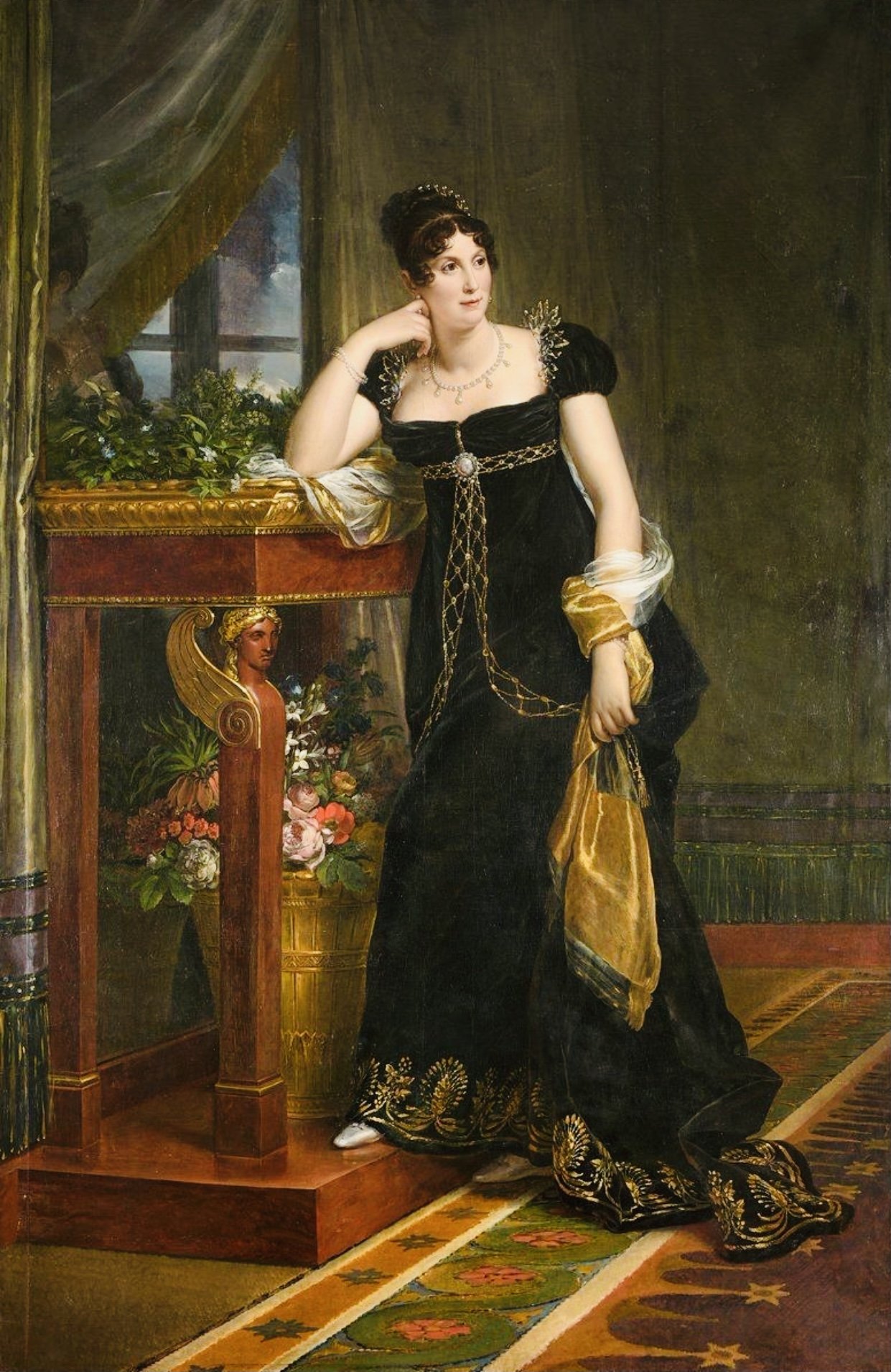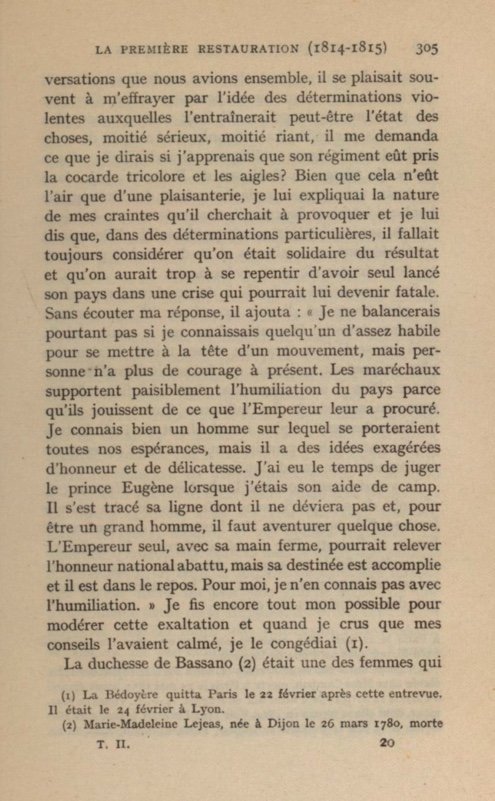Let’s have another look at Hortense’s Memoirs. If you want to read the book it is available for free at the side bar in English and French. Use the widget on the sidebar to translate the text below into pretty much any language.
Hortense describes her various acquaintances and the polarization of their views before the return of the Emperor.
Hortense’s memoirs continues:
Monsieur de La Bedoyère, whom the Emperor had made colonel of an infantry regiment during the last campaign in Germany, had returned to Paris to nurse the wound he had received at Bautzen.
His mother was very anxious he should marry Mademoiselle de Chastellux, a young and pretty woman. For a long time, he had refused to do so, although I also had asked him to agree and he declared he valued my advice very highly.
Finally, he had given in to us. I have already mentioned that I had declined the services he had come to offer me at the moment of the capitulation of Paris.
Following this refusal, in spite of the attachment of his family to the Bourbons, he felt that the moment French territory had been invaded the Emperor's cause became that of the nation, and he had proceeded to Fontainebleau where he had remained till after the Emperor's departure.
On his return he had not in any way expressed his adhesion to the new order, had taken no new oath of allegiance, nor sought to hide his opinions, although his regiment had been left him.
He expected to be dismissed from the army. Constantly quarreling with his wife's family, he preferred to spend his evenings at my home. When I reproached him with thus deserting a young, newly married bride he told me that it was with her consent, in order to avoid disputes with his brother-in-law, and that he would be most happy to present her to me after she had had her baby.
Although he never expressed it in so many words, his devotion to me and my interests, which he considered were those of his country, had remained unchanged.
He went every day to court to attend my trial and came back to report to me what had taken place. The more I tried to calm his indignation against my enemies, the more he was revolted by their injustice toward me.
He, like his cousin, Monsieur de Flahaut, no longer wore the Cross of the Legion of Honor. People noticed this and commented on it, attributing it to my influence. I spoke to them about it. They avowed they could no longer regard as a token of distinction a decoration now lavished on men whose only claim to it was that they had held up stage-coaches.
Monsieur de La Bedoyère, however, received an order to join his regiment stationed at Chambery. He made various excuses for tarrying, but at length came to say good-by to me. In our conversations he had enjoyed frightening me by describing the rash resolutions he was liable to take on account of the way things were going; so one morning when I was alone he asked me, half in jest half in earnest, what I should say if I were to hear that his regiment had adopted the tricolor cockade and the eagles.
Although this seemed like a jest, I explained to him the nature of my fears, which he thus sought to arouse. I told him that one must always feel responsible for the result of one's actions on others and that a man would bitterly regret having committed an act which launched his country on a course that might prove fatal to her.
Without listening to my reply, he added: "I would not hesitate if I knew anyone skillful enough to assume the leadership of such a movement, but no one would dare do so at present. The marshals submit quietly to their country's humiliation because they are enjoying the benefits the Emperor secured for them. To be sure I know one man whom all our hopes are based on, but he holds exaggerated ideas of honor and loyalty. I had a chance to judge Prince Eugene when I acted as his aide-de-camp. He has made up his mind he will not deviate from the course he has chosen, and in order to be a great man one must take chances.
The Emperor is the only one who with his genius for command could revive the sentiment of national honor, but his fate is sealed, and he is in retirement. As for me I can only recognize my humiliation."
I again did what I could to calm this state of over-excitement, and when I thought my advice had produced its result, I bade him good-by. The Duchesse de Bassano was one of my most frequent visitors. She came without her husband, who seldom went out and who perhaps would have feared arousing the suspicions of the police if he had accompanied her more than once a month.
Malicious gossip involved him with various political intrigues. Tall, beautiful, with a virginal expression, the Duchesse de Bassano had a calm and sweet face, which her happy existence had preserved and which the vivacity of her emotions rendered the more striking.
She was keenly touched by our recent misfortunes and did not sufficiently conceal her grief over what had taken place. Her husband was severely criticized. The most serious fault he was accused of was that he had had an unfortunate influence over the Emperor.
People forget that a genius is his own guide. The Duke's character and gifts were of the kind which best suited the monarch who had placed confidence in him. The closer the Duke came to his master the more he was obliged to submit to the Emperor's superiority. His weaknesses were too firm an attachment to and too blind an admiration for his sovereign.
His principal merit was to have loved and understood a great man. I also saw frequently the Duchesse de Raguse. She was separated from her husband, childless, and possessed a large fortune.
She could not be happy; her heart needed some outlet. She overestimated the gifts friendship has to offer and the effects of misfortune. She was loyal in her attachments and frequently cynical in her judgments. People considered her changeable and capricious, but that was because wealth cannot cure mistakes of the heart. Monsieur Sosthenes de la Rochefoucauld, who knew my respect and esteem for all sincere opinions, even those contrary to my own cause, and who continued to come and see me in spite of political changes, explained to me his conduct in connection with what had recently taken place.
“I never served the Emperor," he said. One day he asked rather naively why so many people were dissatisfied. The King, he declared, had kept everyone at his post; the former army had not been destroyed, ranks and titles had been respected.
He could not understand why there were so many complaints. I answered with a smile which was slightly malicious: "The officers only keep what they have earned legitimately, but you as well as many others who never went outside of Paris are now wearing the double epaulettes of a colonel. Do you think they consider this right and that they are not alarmed about what may happen in the future?" But I listened without contradicting him when he spoke of the various members of the royal family.
“As far as the King is concerned," he said, "he at least cannot be accused of not being liberal enough. His attitude must even satisfy the Jacobins." The Comte d'Artois seemed to him a true French knight, gracious in manner, witty and well-mannered. The Duchesse d’Angoulême was a masterful woman, a second Maria Theresa, whose firmness of character showed that someday she would make a great queen. The Duc d’Angoulême was shy but well-informed, and every day those who came in contact with him found that he knew more than they would have suspected. The Duc de Berry was a true Henry IV, rather frivolous, a trifle outspoken, but gallant and full of wit, which did not prevent his having a kind heart. Thus, one sees those whom one loves. Might all kings inspire such sentiments.
One day he called to say good-by to me. The Duchesse d’Angoulême was leaving for Bordeaux and he was to be allowed to accompany her. "People," he told me, "are waiting for her with the greatest impatience. All sorts of entertainments are being prepared. Enthusiasm is at its height, and I am delighted personally to participate in these demonstrations of popular rejoicings." The intensity with which he uttered the last sentence made me smile. He noticed it and inquired the reason. "You seem to me to be very young," I answered, "since you attach so much importance to this sort of enthusiasm. People always cheer for anything that arrives with pomp and ceremony and frequently that which the crowd has applauded one day it overthrows the next. I have seen so many of these demonstrations that I can estimate them at their just value."
Now it was his turn to smile and I readily guessed why. Therefore, I added: "Ah, you think perhaps that those acclamations which I may have heard or which may have been addressed to me were perhaps paid for? The slightest incident will show you that those you consider sincere possess no more weight."
These remarks, which were entirely general and which I owed to my experiences, probably appeared to him a little later the explanation of those great events regarding which he thought I was already informed. For since I was able to judge so accurately, I must have known before-hand what was going to happen.
This is the way enthusiasts form their opinions, and how those who are enthusiasts are judged in turn. The verdict which was to decide my son's fate was to be pronounced in the latter part of February. I awaited the result of the trial in a painful anxiety mingled with certain hopes due to the favorable attitude of the judges. But I heard from Monsieur Devaux that sentence had been postponed for a week.
This delay made me think what afterwards proved to be the case, that the government, being anxious to have my children leave France, exercised its influence in my affairs.
The original French is available below:










